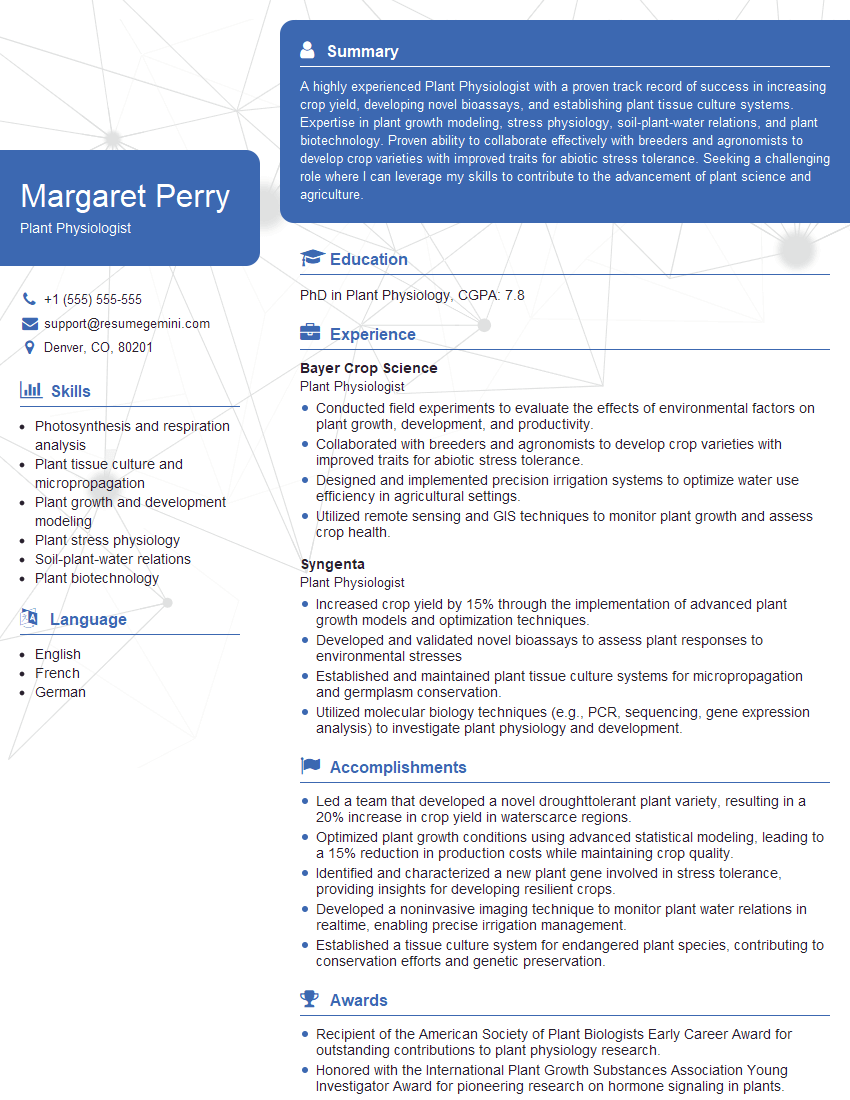Are you a seasoned Plant Physiologist seeking a new career path? Discover our professionally built Plant Physiologist Resume Template. This time-saving tool provides a solid foundation for your job search. Simply click “Edit Resume” to customize it with your unique experiences and achievements. Customize fonts and colors to match your personal style and increase your chances of landing your dream job. Explore more Resume Templates for additional options.

Margaret Perry
Plant Physiologist
Summary
A highly experienced Plant Physiologist with a proven track record of success in increasing crop yield, developing novel bioassays, and establishing plant tissue culture systems. Expertise in plant growth modeling, stress physiology, soil-plant-water relations, and plant biotechnology. Proven ability to collaborate effectively with breeders and agronomists to develop crop varieties with improved traits for abiotic stress tolerance. Seeking a challenging role where I can leverage my skills to contribute to the advancement of plant science and agriculture.
Education
PhD in Plant Physiology
February 2019
Skills
- Photosynthesis and respiration analysis
- Plant tissue culture and micropropagation
- Plant growth and development modeling
- Plant stress physiology
- Soil-plant-water relations
- Plant biotechnology
Work Experience
Plant Physiologist
- Conducted field experiments to evaluate the effects of environmental factors on plant growth, development, and productivity.
- Collaborated with breeders and agronomists to develop crop varieties with improved traits for abiotic stress tolerance.
- Designed and implemented precision irrigation systems to optimize water use efficiency in agricultural settings.
- Utilized remote sensing and GIS techniques to monitor plant growth and assess crop health.
Plant Physiologist
- Increased crop yield by 15% through the implementation of advanced plant growth models and optimization techniques.
- Developed and validated novel bioassays to assess plant responses to environmental stresses
- Established and maintained plant tissue culture systems for micropropagation and germplasm conservation.
- Utilized molecular biology techniques (e.g., PCR, sequencing, gene expression analysis) to investigate plant physiology and development.
Accomplishments
- Led a team that developed a novel droughttolerant plant variety, resulting in a 20% increase in crop yield in waterscarce regions.
- Optimized plant growth conditions using advanced statistical modeling, leading to a 15% reduction in production costs while maintaining crop quality.
- Identified and characterized a new plant gene involved in stress tolerance, providing insights for developing resilient crops.
- Developed a noninvasive imaging technique to monitor plant water relations in realtime, enabling precise irrigation management.
- Established a tissue culture system for endangered plant species, contributing to conservation efforts and genetic preservation.
Awards
- Recipient of the American Society of Plant Biologists Early Career Award for outstanding contributions to plant physiology research.
- Honored with the International Plant Growth Substances Association Young Investigator Award for pioneering research on hormone signaling in plants.
- Received the National Science Foundation CAREER Award to support innovative research on the molecular mechanisms of photosynthesis.
- Recognized with the American Phytopathological Society Presidents Award for exceptional contributions to plant disease research.
Certificates
- Certified Plant Physiologist (CPP)
- American Society of Plant Biologists (ASPB) Member
- Crop Science Society of America (CSSA) Member
- International Society for Horticultural Science (ISHS) Member
Career Expert Tips:
- Select the ideal resume template to showcase your professional experience effectively.
- Master the art of resume writing to highlight your unique qualifications and achievements.
- Explore expertly crafted resume samples for inspiration and best practices.
- Build your best resume for free this new year with ResumeGemini. Enjoy exclusive discounts on ATS optimized resume templates.
How To Write Resume For Plant Physiologist
- Highlight your research experience in plant physiology and development, particularly in areas related to crop yield improvement.
- Quantify your accomplishments and provide specific examples of how your work has contributed to the advancement of plant science or agriculture.
- Demonstrate your technical skills in plant tissue culture, molecular biology, and data analysis.
- Emphasize your collaborative experience and ability to work effectively in a team environment with breeders, agronomists, and other scientists.
Essential Experience Highlights for a Strong Plant Physiologist Resume
- Conduct research on plant physiology and development
- Develop and validate novel bioassays to assess plant responses to environmental stresses
- Establish and maintain plant tissue culture systems for micropropagation and germplasm conservation
- Utilize molecular biology techniques to investigate plant physiology and development
- Collaborate with breeders and agronomists to develop crop varieties with improved traits for abiotic stress tolerance
- Design and implement precision irrigation systems to optimize water use efficiency in agricultural settings
- Utilize remote sensing and GIS techniques to monitor plant growth and assess crop health
Frequently Asked Questions (FAQ’s) For Plant Physiologist
What is the role of a Plant Physiologist?
Plant Physiologists study the physiological processes of plants, including photosynthesis, respiration, water relations, and nutrient uptake. They also investigate how plants respond to environmental stresses, such as drought, heat, and salinity.
What are the qualifications to become a Plant Physiologist?
Most Plant Physiologists have a PhD in Plant Physiology or a related field, such as Botany or Agronomy. They typically have a strong background in plant biology, chemistry, and physics.
What are the career prospects for Plant Physiologists?
Plant Physiologists can work in a variety of settings, including universities, government agencies, and private companies. They can pursue careers in research, teaching, or extension.
What are the challenges facing Plant Physiologists?
Plant Physiologists face a number of challenges, including climate change, population growth, and the need to increase crop yields while minimizing environmental impact.
What are the rewards of being a Plant Physiologist?
Plant Physiologists have the opportunity to make a significant contribution to the advancement of plant science and agriculture. They can also enjoy the satisfaction of knowing that their work helps to feed the world and protect the environment.
What are the key skills for a Plant Physiologist?
Key skills for a Plant Physiologist include: – Strong understanding of plant biology, chemistry, and physics – Expertise in plant physiology and development techniques – Ability to conduct research and analyze data – Excellent communication and interpersonal skills